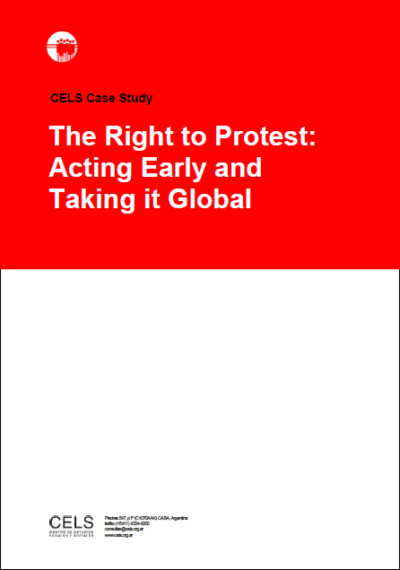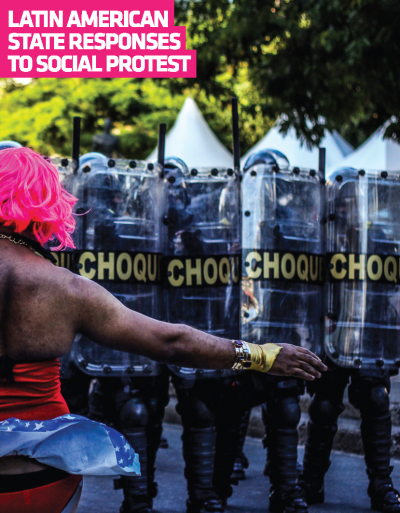Argentines, again, resoundingly reject impunity for crimes against humanity
Some half a million people took to the streets in Buenos Aires alone to reject a Supreme Court decision aimed at dramatically reducing prison terms for perpetrators of crimes against humanity during the last dictatorship.
Tigre: The municipality and province must provide basic services to the Garrote neighborhood
An appeals court in Buenos Aires ratified, on human rights grounds, a previous judicial order that benefits residents of the Garrote neighborhood.
Argentine state faces UN Committee Against Torture
The Argentine state’s compliance with the Convention against Torture will be evaluated on Wednesday, April 26 and Thursday, April 27. CELS submitted a report to the UN Committee that carries out the evaluation and contributed to two reports produced with other organizations.
The Right to Protest: Acting Early and Taking it Global
Autor/a: CELS
5 pgs.
ver más
Ten years after the murder of Carlos Fuentealba: the Supreme Court faces a historic opportunity
This is an opportunity for the high court to reverse the impunity in this case and send a clear message on how the state must guarantee the right to protest.
Rodolfo Walsh: 40 years after his disappearance
The day after writing his “Open letter to the Military Junta,” Walsh was ambushed by ESMA agents.
Corporate responsibility in crimes against humanity: Personal reflections
Victorio Paulón, a metalworker and union leader who was detained during Argentina’s 1976-1983 dictatorship, discusses judicial reluctance to prosecute corporate responsibility for the crimes against humanity committed under state terrorism.
IACHR hearing: Argentine state unable to justify the DNU on migrants
The Decree of Necessity and Urgency (DNU) on migrants associates migration with crime, basing its assessment on partial, decontextualized data. This promotes xenophobia and stigmatizes migrants.
IACHR: Repression and criminalization of social protest in Jujuy
The Argentine state was called to appear before the IACHR to give its response regarding the repression and criminalization of social protest in Jujuy. In that province criminal, misdemeanor and administrative proceedings are used to limit the right to protest, freedom of expression and freedom of association.
Deaths in Pergamino police station are the responsibility of provincial state
Seven people detained in a Pergamino police station died in a fire. After the Verbitsky ruling, in which confinement in police facilities was deemed unconstitutional, the number of people held in such establishments went down to 600. Today it is at 3017.
Latin American State Responses to Social Protest
Autor/a: CELS
62 pgs.
ver más
ESMA: failure by justice system to make progress in proceedings for crimes against humanity
The court devotes little time to the hearings. In the final stage of the trial, unjustified motions for judges’ recusal are causing new delays. The past two years of the trial have been spent on the pleadings alone.
Is renting possible?
Seven million people rent in Argentina. A normative framework for rent regulation and public policies that impact supply and guarantee the right to proper housing are necessary. Renters are often exposed to abusive practices by the real estate market and families are pushed toward informal rental markets and overcrowding.
Medical Cannabis: activist arrested
The Buenos Aires provincial police arrested a member of the Canabicultores de Zona Sur cannabis growers group, which produces cannabis for therapeutic use. The arrest occurred at the same time as the Chamber of Deputies was passing a bill to regulate the use of medicinal cannabis, although the wording of the bill does not account for cases like Adriana’s.
On the arrest of César Milani
While the arrest gives a sense of satisfaction to the victims and society, the lawsuits investigating Milani for crimes against humanity have been notable for their delays. This decision should have been reached long ago.
120 organizations ask Argentine state to withdraw Carlos Horacio de Casas’ candidacy to IACHR
The career of Carlos Horacio de Casas, candidate for membership on the IACHR, has no ties to the defense or promotion of human rights, but rather to corporate, economic criminal and tax law. We contest his candidacy.




